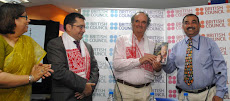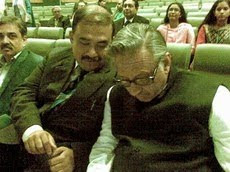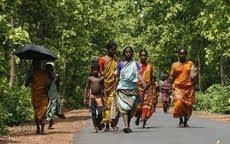 Sri Lanka and assasinate a few leaders. But we can safely say the best days of the LTTE is over and it will never be able to achieve its prime objective - an independent homeland called Eelam. The Sri Lankan army has recaptured almost the entire north and eastern areas of the country where the LTTE had established firm control and run a parellel administration for two decades. The battle lines have often swung back and forth, the Tigers have lost some areas to the army only to take it back by heavy and succesful counter-attack. But this time, there is no counter-attack, no rearguard action, no chance for
Sri Lanka and assasinate a few leaders. But we can safely say the best days of the LTTE is over and it will never be able to achieve its prime objective - an independent homeland called Eelam. The Sri Lankan army has recaptured almost the entire north and eastern areas of the country where the LTTE had established firm control and run a parellel administration for two decades. The battle lines have often swung back and forth, the Tigers have lost some areas to the army only to take it back by heavy and succesful counter-attack. But this time, there is no counter-attack, no rearguard action, no chance for  Prabhakaran to bounce back with some tactical military magic.
Prabhakaran to bounce back with some tactical military magic.It is a consistent story of LTTE losses and huge gains by Sri Lankan army that has given its chief General Fonesca the confidence to allow his public relations officials to fly in journalists and TV crews to show the world that their victory is real and that the Tigers are finally on the run. The Tigers are trying to use large number of Tamil civilians as their shield and India's Tamil politicians are pressurising Delhi to stop Sri Lanka for a final decisive military offensive Prabhakaran may flee Sri lanka, he may go down fighting but he may also try to open negotiations as he has done so often in the past whenever in a tight corner. The trouble is nobody in Colombo will believe him - and surely no one in Delhi.
 Our readers know much of what has been going on in north and eastern Sri Lanka - it has all been in the papers and the TV channels all over. The Tiger is finally on the run.
Our readers know much of what has been going on in north and eastern Sri Lanka - it has all been in the papers and the TV channels all over. The Tiger is finally on the run.I hope the leaders of our separatist movements in Northeast India and Kashmir are getting enough information about the fighting in Sri Lanka and what is happening to the great Prabhakaran. The Sri Lankan army is not as strong as many armies in South Asia - but its morale and fighting abilities have improved over the years as its military leaders have absorbed the lessons of earlier defeats and analysed the strengths and weaknesses of the Tigers.
Now if the great Prabhakaran, with all his navy and air wings and his deadly suicide squads (the only non-Muslim terror group in the world to use suicide attacks so frequently) is failing to hold his own against the Sri Lankan army, do our separatist leaders in Northeast and Kashmir expect to win independence for their people against the formidable Indian military machine backed, as it is, by the shrewd Brahminical statecraft of its political-bureaucratic establishment in a world where use of arms for however noble a cause is often seen as a manifestation of terror. I dont think they stand a chance.
Northeast and Kashmir expect to win independence for their people against the formidable Indian military machine backed, as it is, by the shrewd Brahminical statecraft of its political-bureaucratic establishment in a world where use of arms for however noble a cause is often seen as a manifestation of terror. I dont think they stand a chance.
Now if the great Prabhakaran, with all his navy and air wings and his deadly suicide squads (the only non-Muslim terror group in the world to use suicide attacks so frequently) is failing to hold his own against the Sri Lankan army, do our separatist leaders in
 Northeast and Kashmir expect to win independence for their people against the formidable Indian military machine backed, as it is, by the shrewd Brahminical statecraft of its political-bureaucratic establishment in a world where use of arms for however noble a cause is often seen as a manifestation of terror. I dont think they stand a chance.
Northeast and Kashmir expect to win independence for their people against the formidable Indian military machine backed, as it is, by the shrewd Brahminical statecraft of its political-bureaucratic establishment in a world where use of arms for however noble a cause is often seen as a manifestation of terror. I dont think they stand a chance. I think the strongest separatist group in Northeast, the National Socialist Council of Nagalim (NSCN-Muivah faction) has realised this for some time now. Which is why, despite their unhappiness at the extremely slow progress in their eleven year dialogue with Delhi, the
 NSCN is not calling off the talks and heading back to the jungles to renew their guerrilla war against Indian security forces. Their leader Thuingaleng Muivah is easily the most experienced of the separatist leaders in the Northeast. He was trained in China at the peak of the Cultural Revolution and trained extensively in Maoist guerrilla tactics and ideology.
NSCN is not calling off the talks and heading back to the jungles to renew their guerrilla war against Indian security forces. Their leader Thuingaleng Muivah is easily the most experienced of the separatist leaders in the Northeast. He was trained in China at the peak of the Cultural Revolution and trained extensively in Maoist guerrilla tactics and ideology.Muivah, more than anyone else, realises that his guerrillas cannot create a Nagalim by force of arms. That explains his climbdown from outright sovereignity to what the NSCN now describes as "a special federal relationship" with India. If Muivah had given up his demand for incorporation of the Naga inhabited areas of Manipur, Assam and Arunachaol Pradesh, we would have had a settlement of the Naga insurgency by now. Because Muivah is a Naga from Manipur, he can never give up this demand. But Delhi can only accept his demand at the riskn of provoking more trouble in Manipur and Assam, if not in Arunachal Pradesh.
What Muivah realised in 1996 - and what Prabhakaran and even Paresh Barua has failed to realise - is that there's no way a separatist movement can thrive and survive against a powerful - or even not so powerful) nation state with a modern military machine.
 And Muivah is someone who had marched 1000 kilometres through Burmese jungles to reach China on not one but several occassions. He is not one who is sitting in AC bungalows in Dhaka and sending the boys to plant a few bombs here and there - he has lived a hugely hard jungle for three decades since he joined the Naga separatist movement in 1961. So he has not broken off the dialogue and asked his boys to go back to the jungles because he knows the Nagas are tired of fighting and being trapped in a crossfire of security forces and insurgents. This war fatigue has caught up with the Jaffna Tamils, so LTTE is not getting a steady flow of motivated recruits anymore to man the trenches . That explains the LTTE's collapse like a pack of cards this time.
And Muivah is someone who had marched 1000 kilometres through Burmese jungles to reach China on not one but several occassions. He is not one who is sitting in AC bungalows in Dhaka and sending the boys to plant a few bombs here and there - he has lived a hugely hard jungle for three decades since he joined the Naga separatist movement in 1961. So he has not broken off the dialogue and asked his boys to go back to the jungles because he knows the Nagas are tired of fighting and being trapped in a crossfire of security forces and insurgents. This war fatigue has caught up with the Jaffna Tamils, so LTTE is not getting a steady flow of motivated recruits anymore to man the trenches . That explains the LTTE's collapse like a pack of cards this time.If the NSCN - which is now a fighting force of 6000 guerrillas - cannot risk another fresh conflict with the Indian army, if the Tigers are not able to hold their areas that they have held for so long, what is the future of the ULFA ? Can it ever dream of holding any area in Assam against the Indian army ? Without holding area, no separatist movement can even think of achieving independence. Paresh Barua had once joked that he will atleast liberate Sadiya - at the current moment, he can never do that.
So why get the boys killed for a cause that the leader knows can't be achieved ? Jiten Dutta and Mrinal Hazarika have a better idea of the ground realities than the leaders sitting in a far-off Dhaka , where the change of government may not help their cause anymore.

Setting off a few bombs here and there and
killing a few innocent people will not get the movement anywhere. It will only reinforce the ULFA's credentials as a terror group.
Paresh Barua and Arabinda Rajkhowa must realise the ULFA has no future unless they get the politics right. They have to abandon the militarism they picked up in their early days with the Kachins , who have long been on ceasefire with the Burmese. Time is running out for the ULFA - and other Northeast Indian separatist groups. They must get back their political bearings. They must engage the Indian state in a meaningful dialogue and work for a viable solution to the Assam problem. Swadhinata is an elusive dream. Laldenga understood this in 1986, it took another decade for Muivah to understand this, so it is high time Paresh Barua and Manipuri friends understand this.
The Indian federation has many problems and smaller nationalities who dont command a substantial parliamentary presence dont always get their voice heard in Delhi. To that extent, the guns were perhaps necessary in the beginning. Not anymore. Politics, as Chairman Mao said, should always command the guns . Not the other way round.
Post your Feedback on this column at : feedback@bengalnewz.com OR feedback2bn@gmail.com







